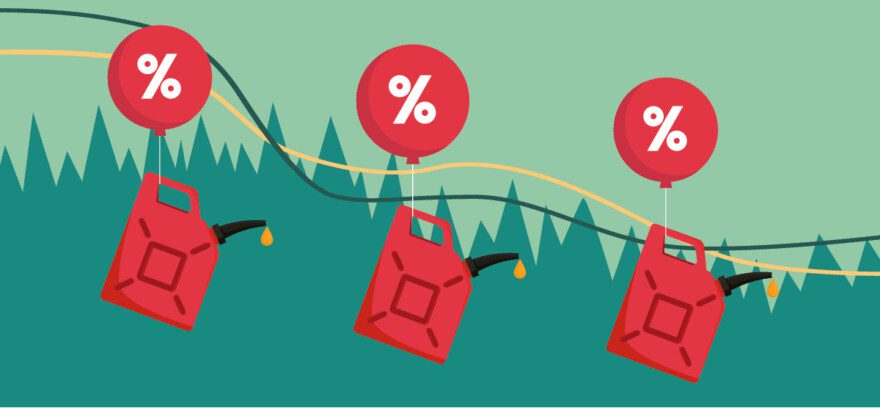UK markets were positive this week with the FTSE 100 Index rising by 1.5% to trade at 8,370 points at the time of writing.
UK consumer price inflation fell more than expected to a three year low of 1.7% in September, prompting the Pound to fall and investors to increase bets on further interest rate cuts from the Bank of England this year. The data, which was released by the Office for National Statistics on Wednesday showed that inflation has reduced to below the Bank of England’s 2% target for the first time since April 2021. The figure was less than the 1.9% forecast by economists in a Reuters poll and compares with August’s figure of 2.2%.
The fall in inflation was primarily driven by lower airfares and petrol prices. Core consumer price inflation, also fell by 0.4% since August, dropping to 3.2% in September and lower than economists’ expectations for 3.4%. The rate of services inflation, seen by the central bank as a key gauge of underlying price pressures, fell from 5.6% to 4.9%.
UK wage growth, excluding bonuses, fell to 4.9% in the three months to August, compared with 5.1% in the three months to July, in line with analysts’ expectations, according to figures from the Office for National Statistics. Including bonuses, wage growth was lower at 3.8%, but this figure was skewed by large one-off bonuses to public sector workers last year.
The Office for National Statistics said tax records showed that payroll employment fell slightly, by 35,000 or 0.1% in August, while provisional figures for September suggested employment was virtually unchanged. The data adds to evidence that pay pressures in the economy are easing. It also corroborates recent business surveys suggesting many employers have put hiring on hold ahead of this month’s Budget as they await more certainty over government policy on tax and spending.
Elsewhere, British retail sales grew unexpectedly for the third month in a row in September, increasing by 0.3%, according to figures from the Office for National Statistics and much stronger than the 0.3% contraction forecast by economists polled by LSEG.
Commodity markets
In the commodity markets, Brent crude futures traded around $74 per barrel on Friday and are set for a weekly fall, after OPEC and the International Energy agency cut their forecasts for global oil demand in 2024 and 2025. Israel has reportedly told the US that it will refrain from hitting Iran’s oil facilities in retaliation for the Islamic Republic’s October 1st ballistic missile attack.
The oil market sold off steeply on Tuesday on reports that Israel will limit its strike to military targets in Iran. US crude production hit a record high of 13.5 million barrels per day last week, data from the Energy Information Administration showed, adding to concerns about rising supply as Libyan output resumed and OPEC+ planned to further unwind production cuts in 2025.
Gold prices traded around $2,670 an ounce on Friday hitting a record high this week as uncertainty surrounding the US presidential elections and the war in the Middle East prompted investors to seek out the safe-haven asset, while an easing monetary policy environment kept prices elevated.
The European Central Bank cut interest rates by 0.25% to 3.25% on Thursday, amid signs that growth and inflation in the Eurozone are weakening.
Eurozone interest rates are now at their lowest point since May 2023, flowing a previous 0.25% cut at the European Central Bank’s last meeting, held in September.
Gold, which yields no interest on its own, tends to do well when interest rates are cut.
Equity markets
US equity futures were positive on Friday as US economic data pointed to a strengthening economy, which boosted the Dollar and treasury yields, whilst investors still see a further Federal Reserve rate cut in November. In Thursday’s regular session, the Dow Jones Industrial Average rose 0.37%, the S&P 500 lost 0.02%, while the Nasdaq Composite advanced 0.04%.
US retail sales increased slightly more than expected in September, supporting views that the economy maintained a strong pace of growth in the third quarter. Retail sales rose by 0.4% last month, after an unrevised 0.1% gain in August, according to figures from the Commerce Department’s Census Bureau. Economists polled by Reuters had forecast retail sales would rise by 0.3%.
Signs of the economy’s resilience is unlikely to discourage the Federal Reserve from cutting interest rates again next month but will reinforce expectations for a smaller 0.25% reduction in borrowing costs. Spending and the overall US economy are being underpinned by solid income growth, ample savings as well as strong household balance sheets. Although the labour market momentum has slowed, layoffs remain historically low, supporting wage gains.
The number of Americans filing new applications for unemployment unexpectedly fell to 19,000 last week to a seasonally adjusted 241,000 for the week ended October 12th, the Labor Department said on Thursday. Economists in a Reuters poll had forecast 260,000 claims for the latest week. The drop came after a surge in claims the previous week, largely due to disruptions from Hurricanes Helene and Miton. Despite this decline, claims remain well above the averages seen earlier this year, reflecting a softening of the US labour market since its post-pandemic peak.
The information provided in this communication is not advice or a personal recommendation, and you should not make any investment decisions on the basis of it. If you are unsure of whether an investment is right for you, please seek advice. If you choose to invest, your capital may be at risk and the value of an investment may fall as well as rise in value, so you could get back less than you originally invested.
